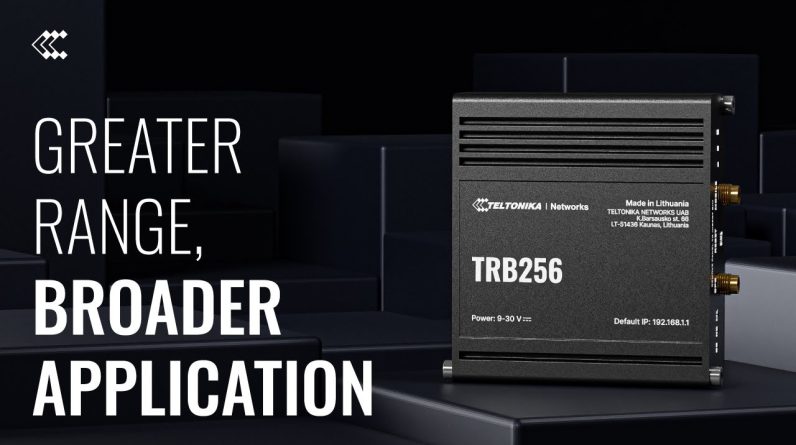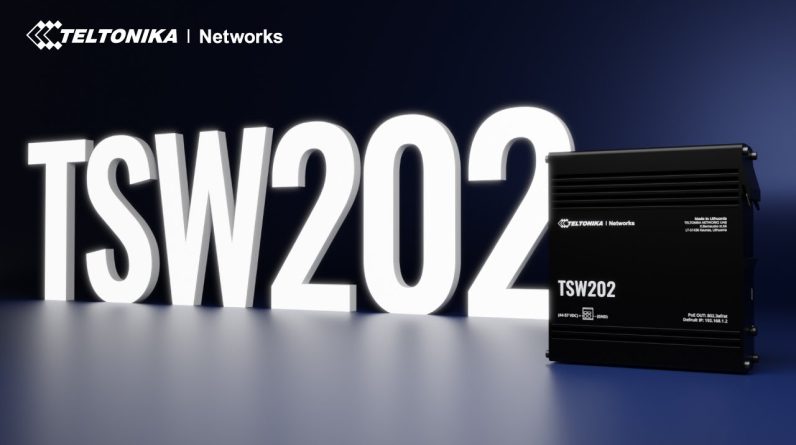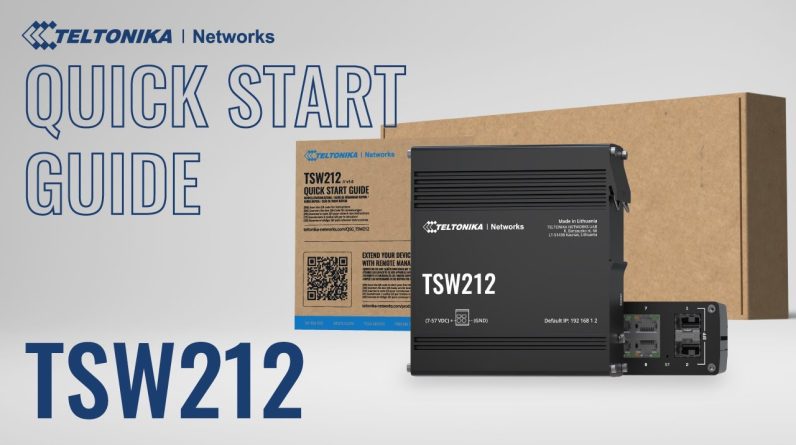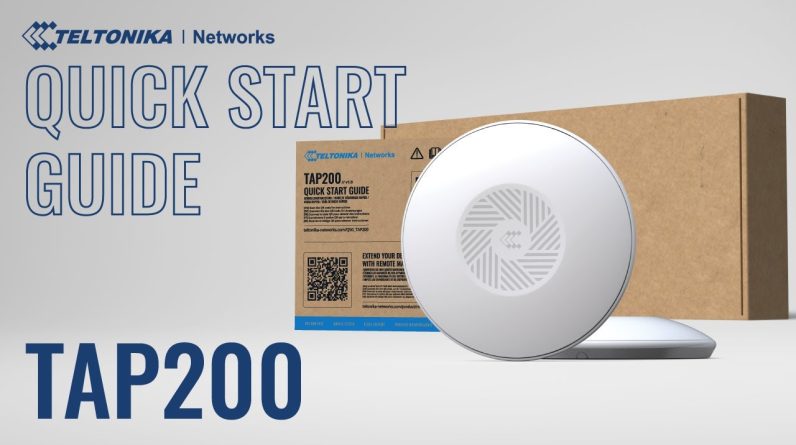Introducing RUTM50, the FCC-certified Teltonika Networks cellular 5G router designed specifically for North America. With lightning-fast cellular speeds of up to 3.4 Gbps, this dual SIM router ensures seamless connectivity. Equipped with auto-failover and backup WAN, it guarantees uninterrupted network access. The RUTM50 supports both SA and NSA 5G architectures, providing flexibility for different network setups. Not only that, but it is also backward compatible with 4G (LTE Cat 19), making it an ideal choice for future-proofing your industrial networking solutions. Stay connected and stay ahead with the RUTM50!
The future of the North American IoT market is 5G. As the adoption of this technology continues to grow from millions of connections to billions, engineers creating networking solutions with future-proofing in mind cannot afford to stay behind once the twilight of the 4G era finally arrives.
The RUTM50 is designed to support certifications specific to North America. For Europe and other regions, Teltonika has the RUTX50 cellular router.
RUTM50 Specifications
Mobile
-
Mobile module: 5G Sub-6 GHz SA, NSA 2.4, 3.4Gbps DL (4×4 MIMO) 900, 550Mbps UL (2×2 MIMO); 4G (LTE): DL Cat 19 1.6Gbps (4×4 MIMO), UL Cat 18 200Mbps
-
SIM switch: 2 SIM cards, auto-switch cases: weak signal, data limit, SMS limit, roaming, no network, network denied, data connection fail, SIM idle protection
-
Status: Signal strength (RSSI), SINR, RSRP, RSRQ, EC/IO, RSCP, Bytes sent/received, connected band, IMSI, ICCID
-
SMS: SMS status, SMS configuration, send/read SMS via HTTP POST/GET, EMAIL to SMS, SMS to EMAIL, SMS to HTTP, SMS to SMS, scheduled SMS, SMS autoreply, SMPP
-
USSD: Supports sending and reading Unstructured Supplementary Service Data messages
-
Black/White list: Operator black/white list
-
Multiple PDN: Possibility to use different PDNs for multiple network access and services
-
Band management: Band lock, Used band status display
-
APN: Auto APN
-
Bridge: Direct connection (bridge) between mobile ISP and device on LAN
-
Passthrough: Router assigns its mobile WAN IP address to another device on LAN
Wireless
-
Wireless mode: 802.11b, g, n, ac Wave 2 (Wi-Fi 5) with data transmission rates up to 867 Mbps (Dual Band, MU-MIMO)
-
Wi-Fi security: WPA3-EAP, WPA3-SAE, WPA2-Enterprise-PEAP, WPA2-PSK, WEP; AES-CCMP, TKIP, Auto Cipher modes, client separation
-
SSID/ESSID: ESSID stealth mode
-
Wi-Fi users: up to 150 simultaneous connections
-
Wireless Connectivity Features: Wireless mesh (802.11s), fast roaming (802.11r), Relayd
-
Wireless MAC filter: Whitelist, blacklist
Network
-
Hotspot: Captive portal (Hotspot), internal/external Radius server, SMS authorization, internal/external landing page, walled garden, user scripts, URL parameters, user groups, individual user or group limitations, user management, 9 default customizable themes and option to upload and download customised hotspot themes
-
Routing: Static routing, Dynamic routing (BGP, OSPF v2, RIP v1/v2, EIGRP, NHRP), Policy based routing
-
Network protocols: TCP, UDP, IPv4, IPv6, ICMP, NTP, DNS, HTTP, HTTPS, SFTP, FTP, SMTP, SSL/TLS, ARP, VRRP, PPP, PPPoE, UPNP, SSH, DHCP, Telnet, SMPP, SMNP, MQTT, Wake On Lan (WOL)
-
VoIP passthrough support: H.323 and SIP-alg protocol NAT helpers, allowing proper routing of VoIP packets
-
Connection monitoring: Ping Reboot, Wget Reboot, Periodic Reboot, LCP and ICMP for link inspection
-
Firewall: Port forward, traffic rules, custom rules
-
DHCP: Static and dynamic IP allocation, DHCP Relay
-
QoS / Smart Queue Management (SQM): Traffic priority queuing by source/destination, service, protocol or port, WMM, 802.11e
-
DDNS: Supported >25 service providers, others can be configured manually
-
Network backup: Wi-Fi WAN, Mobile, VRRP, Wired options, each of which can be used as an automatic Failover
-
Load balancing: Balance Internet traffic over multiple WAN connections
-
SSHFS: Possibility to mount remote file system via SSH protocol
Ethernet
-
WAN: 1 x WAN port 10/100/1000 Mbps, compliance with IEEE 802.3, IEEE 802.3u, 802.3az standards, supports auto MDI/MDIX crossover
-
LAN: 4 x ETH ports, 10/100/1000 Mbps, supports auto MDI/MDIX crossover
Security
-
Authentication: Pre-shared key, digital certificates, X.509 certificates, TACACS+, Radius, IP & Login attempts block
-
Firewall: Pre-configured firewall rules can be enabled via WebUI, unlimited firewall configuration via CLI; DMZ; NAT; NAT-T
-
Attack prevention: DDOS prevention (SYN flood protection, SSH attack prevention, HTTP/HTTPS attack prevention), port scan prevention (SYN-FIN, SYN-RST, X-mas, NULL flags, FIN scan attacks)
-
VLAN: Port and tag-based VLAN separation
-
Mobile quota control: Mobile data limit, customizable period, start time, warning limit, phone number
-
WEB filter: Blacklist for blocking out unwanted websites, Whitelist for specifying allowed sites only
-
Access control: Flexible access control of TCP, UDP, ICMP packets, MAC address filter
VPN
-
OpenVPN: Multiple clients and a server can run simultaneously, 27 encryption methods
-
OpenVPN Encryption: DES-CBC 64, RC2-CBC 128, DES-EDE-CBC 128, DES-EDE3-CBC 192, DESX-CBC 192, BF-CBC 128, RC2-40-CBC 40, CAST5-CBC 128, RC2-64-CBC 64, AES-128-CBC 128, AES-128-CFB 128, AES-128-CFB1 128, AES-128-CFB8 128, AES-128-OFB 128, AES-128-GCM 128, AES-192-CFB 192, AES-192-CFB1 192, AES-192-CFB8 192, AES-192-OFB 192, AES-192-CBC 192, AES-192-GCM 192, AES-256-GCM 256, AES-256-CFB 256, AES-256-CFB1 256, AES-256-CFB8 256, AES-256-OFB 256, AES-256-CBC 256
-
IPsec: IKEv1, IKEv2, with 14 encryption methods for IPsec (3DES, DES, AES128, AES192, AES256, AES128GCM8, AES192GCM8, AES256GCM8, AES128GCM12, AES192GCM12, AES256GCM12, AES128GCM16, AES192GCM16, AES256GCM16)
-
GRE: GRE tunnel, GRE tunnel over IPsec support
-
PPTP, L2TP: Client/Server instances can run simultaneously, L2TPv3, L2TP over IPsec support
-
Stunnel: Proxy designed to add TLS encryption functionality to existing clients and servers without any changes in the program’s code
-
DMVPN: Method of building scalable IPsec VPNs
-
SSTP: SSTP client instance support
-
ZeroTier: ZeroTier VPN client support
-
WireGuard: WireGuard VPN client and server support
-
Tinc: Tinc offers encryption, authentication and compression in it’s tunnels. Client and server support.
BACNET
-
Supported modes: Router
-
Supported connection types: TCP
OPC UA
-
Supported modes: Client, Server (planned)
-
Supported connection types: TCP
MODBUS
-
Supported modes: Server, Client
-
Supported connection types: TCP, USB
-
Custom registers: MODBUS TCP custom register block requests, which read/write to a file inside the router, and can be used to extend MODBUS TCP Slave functionality
-
Supported data formats: 8-bit: INT, UINT; 16-bit: INT, UINT (MSB or LSB first); 32-bit: float, INT, UINT (ABCD (big-endian), DCBA (little-endian), CDAB, BADC), HEX, ASCII
DATA TO SERVER
- Protocol: HTTP(S), MQTT, Azure MQTT,
Modbus MQTT GATEWAY
-
Modbus MQTT Gateway: Allows sending commands and receiving data from MODBUS Master through MQTT broker
DNP3
-
Supported modes: Station, Outstation
-
Supported connection: TCP, USB
Monitoring & Management
-
WEB UI: HTTP/HTTPS, status, configuration, FW update, CLI, troubleshoot, event log, system log, kernel log
-
FOTA: Firmware update from server, automatic notification
-
SSH: SSH (v1, v2)
-
SMS: SMS status, SMS configuration, send/read SMS via HTTP POST/GET
-
Call: Reboot, Status, Mobile data on/off, Output on/off, answer/hang-up with a timer, Wi-Fi on/off
-
TR-069: OpenACS, EasyCwmp, ACSLite, tGem, LibreACS, GenieACS, FreeACS, LibCWMP, Friendly tech, AVSystem
-
MQTT: MQTT Broker, MQTT publisher
-
SNMP: SNMP (v1, v2, v3), SNMP Trap
-
JSON-RPC: Management API over HTTP/HTTPS
-
MODBUS: MODBUS TCP status/control
-
RMS: Teltonika Remote Management System (RMS)
IoT Platforms
-
Cloud of Things: Allows monitoring of: Device data, Mobile data, Network info, Availability
-
ThingWorx: Allows monitoring of: WAN Type, WAN IP, Mobile Operator Name, Mobile Signal Strength, Mobile Network Type
-
Cumulocity: Allows monitoring of: Device Model, Revision and Serial Number, Mobile Cell ID, ICCID, IMEI, Connection Type, Operator, Signal Strength, WAN Type and IP
-
Azure IoT Hub: Can send device IP, Number of bytes send/received, Temperature, PIN count to Azure IoT Hub server, Mobile connection state, Network link state, IMEI, ICCID, Model, Manufacturer, Serial, Revision, IMSI, SIM State, PIN state, GSM signal, WCDMA RSCP, WCDMA EC, IO, LTE RSRP, LTE SINR, LTE RSRQ, CELL ID, Operator, Operator number, Connection type, Temperature, PIN count to Azure IoT Hub server
System Characteristics
-
CPU: MediaTek MT7621A, Dual-Core, 880 MHz, MIPS1004Kc
-
RAM: 256 MB, DDR3
-
FLASH storage: 16MB serial NOR flash, 256MB serial NAND flash
Firmware / Configuration
-
WEB UI: Update FW from file, check FW on server, configuration profiles, configuration backup
-
FOTA: Update FW
-
RMS: Update FW/configuration for multiple devices at once
-
Keep settings: Update FW without losing current configuration
FIRMWARE CUSTOMISATION
-
Operating system: RutOS (OpenWrt based Linux OS)
-
Supported languages: Busybox shell, Lua, C, C++, and Python, Java in Package manager
-
Development tools: SDK package with build environment provided
Location Tracking
-
GNSS: GPS, GLONASS, BeiDou, Galileo and QZSS
-
Coordinates: GNSS coordinates via WebUI, SMS, TAVL, RMS
-
NMEA: NMEA 0183
-
NTRIP: NTRIP protocol (Networked Transport of RTCM via Internet Protocol)
-
Server software: Supported server software TAVL, RMS
-
Geofencing: Configurable multiple geofence zones
USB
-
Data rate: USB 2.0
-
Applications: Samba share, USB-to-serial
-
External devices: Possibility to connect external HDD, flash drive, additional modem, printer, USB-serial adapter
-
Storage formats: FAT, FAT32, exFAT, NTFS (read-only), ext2, ext3, ext4
Input / Output
-
Input: 1 x Digital Input, 0 – 6 V detected as logic low, 8 – 50 V detected as logic high
-
Output: 1 x Digital Output, Open collector output, max output 50 V, 300 mA
-
Events: Email, RMS, SMS
-
I/O juggler: Allows to set certain I/O conditions to initiate event
Power
-
Connector: 4-pin industrial DC power socket
-
Input voltage range: 9 – 50 VDC, reverse polarity protection, surge protection >51 VDC 10us max
-
PoE (passive): Passive PoE over spare pairs. Possibility to power up through LAN port, not compatible with IEEE802.3af, 802.3at and 802.3bt standards, Mode B, LAN1 Port, 9 – 50 VDC
-
Power consumption: Idle: <5 W, Max: <18 W
Physical Interfaces
-
Ethernet: 5 x RJ45 ports, 10/100/1000 Mbps
-
I/O’s: 1 x Digital Input, 1 x Digital Output on 4-pin power connector
-
Status LEDs: 3 x connection status LEDs, 3 x connection strength LEDs, 10 x Ethernet port status LEDs, 4 x WAN status LEDs, 1 x Power LED, 2 x 2.4G and 5G Wi-Fi LEDs
-
SIM: 2 x SIM slot (Mini SIM – 2FF), 1.8 V/3 V
-
Power: 1 x 4-pin power connector
-
Antennas: 4 x SMA for Mobile, 2 x RP-SMA for Wi-Fi, 1 x SMA for GNNS
-
USB: 1 x USB A port for external devices
-
Reset: Reboot/User default reset/Factory reset button
-
Other: 1 x Grounding screw
Physical Specification
-
Casing material: Aluminum housing
-
Dimensions (W x H x D): 132 x 44.2 x 95.1 mm
-
Weight: 519 grams
-
Mounting options: DIN rail (can be mounted on two sides), flat surface placement
Operating Environment
-
Operating temperature: -40 °C to 75 °C
-
Operating humidity: 10% to 90% non-condensing
-
Ingress Protection Rating: IP30
Regulatory & Type Approvals
-
Regulatory: FCC, IC, PTCRB
RF
-
Standards (Wi-Fi 2.4 GHz, 5 GHz): 47 CFR Part 15 Subpart C – § 15.247, Subpart E – § 15.407, RSS-247 Issue 2 (February 2017), RSS-Gen Issue 5 (April 2018) Amendment 2 (February 2021), KDB 905462 D02 UNII DFS Compliance Procedures New Rules v02, KDB 905462 D04 Operational Modes for DFS Testing New Rules v01
-
Standards (4G, 5G): 47 CFR Part 2, Part 22 Subpart H, Part 24 Subpart E, Part 27 Subpart C, Part 90 Subpart R/S, Part 96, RSS-130 Issue 2 (February 2019), RSS-132 Issue 3 (January 2013), RSS-133 Issue 6 (January 2018) Amendment, RSS-139 Issue 3 (July 2015), RSS-140 Issue 1 (April 2018), RSS-192 Issue 4 (May 2020), RSS-195 Issue 2 (April 2014), RSS-197 Issue 1 (February 2010), RSS-199 Issue 3 (December 2016), RSS-Gen Issue 5 (April 2018) Amendment 2, SRSP-503 Issue 7 (September 2008), SRSP-510 Issue 5 (February 2009), SRSP-513 Issue 3 (July 2015), SRSP-516 Issue 1 (April 2014), SRSP-517 Issue 1 (July 2014), SRSP-518 Issue 2 (February 2019), SRSP-520 Issue 2 (November 2021)
EMC Emissions & Immunity
-
Standards: 47 CFR Part 15 Subpart B, ICES-003: Issue 7 (October 2020)
See also: RUTM50 Cellular 5G Router Quick Start Guide
The RUTM50 is designed to support certifications specific to North America. For Europe and other regions, Teltonika has the RUTX50 cellular router. See RUTX50 – Industrial 5G Router and RUTX50 – Industrial 5G Router | Quick Start Guide








